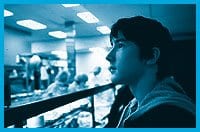Gus Van Sant is Arguably the most un-American US filmmaker working in movies today. Not anti-American in that Osama kind of way. But un-American in that his work resists the national urge (eagerly fed by the current US government) to see the world in black and white, to find definitive answers and to avoid any kind of self-examination.
In films as diverse as Drugstore Cowboy, To Die For and My Own Private Idaho, the openly gay director swims calmly against the tide, situating his stories in the US and spotlighting issues and characters most people would rather ignore (drug addicts, male hustlers, fame-obsessed femmes) while subtly questioning the societal factors that contribute to their situation.
So it’s no surprise that in his latest film Elephant, Van Sant turns his lens on an institution that seems to garner adult attention only when blood is shed – high school.
By now, you’ll know that the film is loosely based on the 1999 Columbine high school shootings. You may have also heard that Elephant won the top two prizes at this year’s Cannes Film Festival, and has been blasted by some critics as anti-American (in that Osama kind of way), and hailed by the French (those contrarians) as a masterpiece.
Elephant is a mesmerizing, difficult, powerful, frustrating and honest look at the American education system and its sometimes benign, often malignant impact on the youth who pass through it. Filmed with documentary-like authenticity and improvised by a cast of teenagers with no acting experience, the film precisely captures the quiet terrors, mindless monotony, casual encounters and small triumphs that are part of an average day at an ordinary high school in Anytown, USA.
The not-so-subtle pressure to conform or perish will strike a chord with queer viewers who may recall all too well the self-preservation tactics adopted to make it to graduation.
In long, gorgeously photographed scenes, a relentless camera tracks several students through the school as they go to class, eat lunch, attend football practice, pass each other in the hallways, chat and gossip. Nothing much happens – that’s the way school’s supposed to be.
However, we know how this day is going to end. As the killers Alex (Alex Frost) and Eric (Eric Deulen) map out their plan, Van Sant employs many of the signifiers of disgruntled youth, like violent video games and Nazi websites, but counteracts them by having one of the boys play a Beethoven piece on the piano. And, most provocatively of all, especially for queer viewers, is a kiss in the shower between the two boys, a final act of intimacy before they carry out their plan. The director has stated that this doesn’t make the killers gay, it’s just a kiss, but for a less enlightened audience it offers an easy (if misleading) answer to the question of why the boys are resorting to violence.
The cast of non-professionals are completely genuine and natural in front of the camera, if sometimes a little too Calvin Klein pretty (Van Sant never did meet a cute boy he couldn’t find a role for). It’s fascinating to go back to high school to see that nothing has changed. The clichés and cliques – jocks, stoners, popular girls, nerds – remain entrenched and rigid in their ability to define your place in the social hierarchy, while well-meaning but overburdened teachers rely on this effective form of social Darwinism to maintain order amongst students.
Van Sant provides no explanation, offers no solutions and casts no judgment on the killers. Does the blame lie with bullying, violent video games, access to guns (delivered right to your door!), absent parents, peer pressure, sexual confusion or genetic predisposition? Yes. And no. There’s no easy answer, but as Van Sant points out in Elephant, are we even asking the right questions?
* Elephant opens Fri, Nov 7 at the Cumberland (159 Cumberland St); call (416) 646-0444.

 Why you can trust Xtra
Why you can trust Xtra


